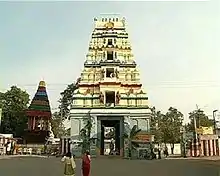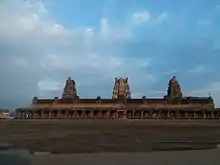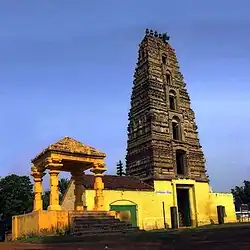| Amararama | |
|---|---|
 Amareswara Swamy temple | |
| Religion | |
| Affiliation | Hinduism |
| District | Palnadu |
| Deity | Shiva |
| Festivals | Maha Shivaratri, Kartika Purnima |
| Location | |
| Location | Amaravathi |
| State | Andhra Pradesh |
| Country | India |
.svg.png.webp) Location in Andhra Pradesh | |
| Geographic coordinates | 16°34′52″N 80°21′32″E / 16.580990°N 80.358946°E |
| Architecture | |
| Type | Dravidian architecture |
| Date established | Unknown |
| Specifications | |
| Temple(s) | 1 |
| Inscriptions | Telugu and Sanskrit |
| Elevation | 31.4 m (103 ft) |
| Part of a series on |
| Hinduism |
|---|
 |
Amararama is one of the five Pancharama Kshetras that are sacred to the Hindu god Siva. The temple is located in Amaravathi town of Palnadu district in the Indian state of Andhra Pradesh.[1] Amareswara Swamy or Amaralingeswara Swamy refers to Lord Shiva in this temple. The temple is situated on the southern bank of Krishna River. The consort of Lord Amareswara Swamy is Bala Chamundika. The Sivalinga at this place is installed and established by Lord Indra.
The Deity
The Sivalinga here is very tall that the archakas mount a pedestal platform, and perform the daily rituals as well as Abhisheka. The top of the Linga has a red stain on it. According to legend, Sivalinga was growing up in size and to stop its growth, a nail has been hit onto the top of the Sivalinga. When the nail dug into the Linga, blood oozed from the Sivalinga.
History
Vasireddy Venkatadri Naidu, King of Chintapalli and later Dharanikota, was a great devotee of Amareswara. He expanded and renovated the temple. The popular legend has it that once during the course of putting down a rebellion in his land the King had to have recourse to a massacre of the Chenchus, whereupon he lost his mental peace, which he regained only when he came to Amaravati. He shifted his place from Chintapalli to Amaravati in 1796, and devoted his entire life, time and revenues to building temples for Lord Siva. He renovated the Amareswaraswamy temple here, engaged nine learned archakas for the daily archana of the Lord, and provided them with all the needs of livelihood, including 12 acres (49,000 m2) of land to each. The temple as it stands owes much to him.
As per Legend, the demon king named Tarakasura defeated the gods after being awarded a boon by Lord Shiva. Shiva vowed to kill the demons and hence the gods came to reside here and since then the place came to be called Amaravati. Lord Shiva is worshipped as Amareswara with his consort Bala Chamundika, who is considered as the fourth of the 18 goddesses.[2] srikrishnadevaraya had visited this temple after the war of kodapalli
Architecture
Amaravati temple has also a wealth of inscriptions on its walls like those of the Kota chiefs of Amaravati and of Sri Krishandevaraya, the great Vijayanagara emperor. On a pillar in the Mukhamantapa the wife of Proli Nayudu, who was minister of Kota King Ketaraja, has left an inscription.[3]

Festivals
The main festivals in the temple are the Mahashivaratri, which comes in the Magha Bahula Dasami and the Navaratri and the Kalyana Utsavas. Amaravati is thus an important Kshetra situated at a particularly sacred spot of the holy river Krishna and is a consecrated place of worship, of importance to Hinduism.[4]
Transport
The temple is located at a distance of 40 km from Guntur.[5] State run APS RTC runs bus services from Guntur, Vijayawada and Mangalagiri to this temple.[6][7]
Renovation
The Gopuram of the temple is renovated as it developed cracks in masonry due to the passage of heavy equipment. It was rebuilt at a cost of Rs.1.56 crore. The former structure was renovated in 1796 by the local ruler Vasireddy Venkatadri Nayudu.[8] During this renovation ancient artifacts dating back 1800 years were found in the Foundation pits.
References
- ↑ "Five for peace". Retrieved 7 October 2017.
- ↑ "Amaralingeswara Temple Amaravati". Archived from the original on 7 October 2017. Retrieved 7 October 2017.
- ↑ Inscriptions in Kakatiya period
- ↑ "Maha Sivaratri celebrated with religious fervour". Retrieved 7 October 2017.
- ↑ "Amaravathi declared heritage city". Retrieved 7 October 2017.
- ↑ "Tourist Services in Guntur Region". Archived from the original on 16 April 2019. Retrieved 7 October 2017.
- ↑ "RTC to operate 300 buses to 'Siva Kshetrams". Retrieved 7 October 2017.
- ↑ "Ancient sculptures found in Amaravati". Retrieved 7 October 2017.




